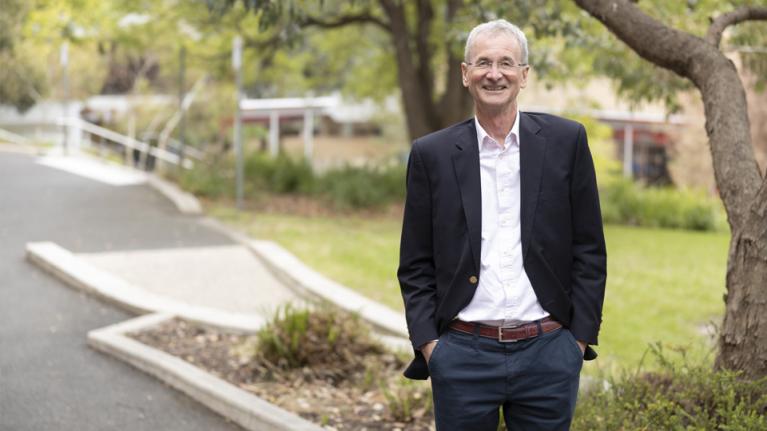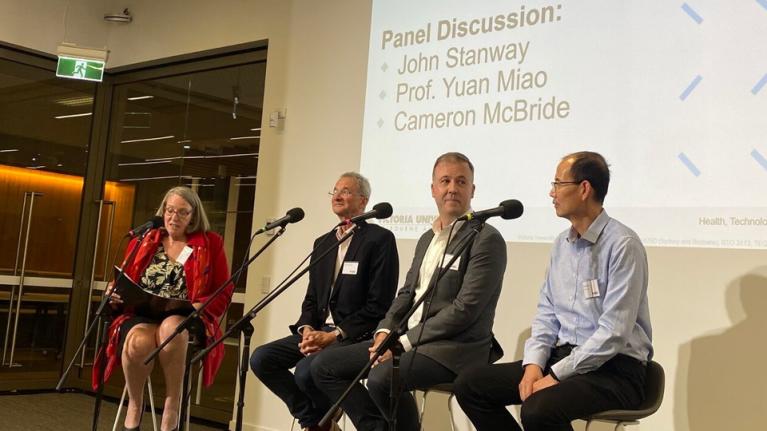Working together in healthcare: a Q&A with John Stanway
John Stanway, a leader in Australian healthcare, President of Children’s Healthcare Australasia and former Royal Children’s Hospital Melbourne Chief Executive Officer (2017-2021), joins VU as 2023 Executive in Residence.
John completed a Graduate Diploma in Industrial Relations at Footscray Institute of Technology (the predecessor to Victoria University) in 1982. Though he didn’t realise it at the time, John believes the skills he developed in the course gave him a strong foundation for future leadership roles.
In between meeting with students, researchers and teachers, we caught up with John to learn more about his experience and perspectives on future challenges in health, health technology and education.

Q&A with John Stanway
You completed a Graduate Diploma of Industrial Relations at Footscray Institute of Technology, in 1982. How did that study experience contribute to your career?
I had no real idea that it would help me to become an executive at various organisations and the Chief Executive of the Royal Children’s Hospital. Because of the role I was in at that time, in human resources and industrial relations at General Motors, I decided to do the study. Footscray Institute was the only organisation that had a Graduate Diploma in Industrial Relations. It was a practical course, for example we had moot industrial commission hearings and I learnt a lot.
The basis of the course, human resources and industrial relations, managing people and conflict and resolving issues in a positive way, held me in excellent stead as I moved up management and leadership hierarchies at various organisations.
My strong view is that, whether you’re in insurance, manufacturing, IT or health, as a leader your role is to support and manage people. So [the Graduate Certificate of Industrial Relations] was a very good basis for my career.
How did you put your management skills into effect working in health when balancing competing priorities: managing people, managing the patient outcomes?
I don’t think they’re competing priorities. One of our sayings in the hospital at the time was ‘if we care for each other, then we will care for patients and their families better’ and that’s true. Creating the right environment and culture for staff to work together to support each other and support patients and families is one and the same.
So those management skills and motivation needs to be present throughout the whole organisation?
Absolutely. The organisation will need good training and development and a good culture, so teams can then operate within that broader structure. But for most people your next up manager is your most important person in an organisation. And if you don’t get on well with your manager you’ve got some challenges. But hopefully that next-up manager has been trained in good people management and performance management and can help you.
When you implemented the Electronic Medical Record at the Royal Children's Hospital in 2016, there was an improvement in patient care and a reduction in mortality rates – can you describe a little bit about that project?
The Electronic Medical Record (EMR) improves clinical care and outcomes, and that has been demonstrated by peer-reviewed research. It’s a big change process to go from paper to electronic across the whole hospital. But like any major project, if you deliver it well and bring the staff along and involve them in processes you will be successful. There is a bit of bedding in, not all staff immediately thought it was a great thing. But, in my view, people get used to it. And then they start to innovate around it and use it in a very positive way.
How can students in health and allied health prepare to innovate and approach this with a positive approach to tech?
For example, VU could set up a mock Electronic Medical Record system, which would give the students an opportunity to use the system and see how it works and be ready to use an EMR effectively when they begin their career in a healthcare organisation.
And how important will it be for people in health and health management roles to work with tech and cybersecurity to ensure the trust in those systems? There’s this idea of AI being a ‘co-pilot’ to complement electronic health record systems; how can you trust the co-pilot if you don’t know where the co-pilot is, or how it is governed?
If you take Victoria for example, the State Government Health Department has set rigorous cybersecurity rules which each organisation with an EMR system, has to meet. The hospital board of directors have accountability to ensure good cybersecurity, and then you’ve got the executive as well as the staff being educated and alert. But nothing is 100% cyber proof as you know.
Being at Victoria University this week and seeing the development of the Footscray Hospital across the road from our Footscray Park Campus, do you think there will be opportunities for students, research and industry to work together on these shared challenges?
A good health precinct will have research, clinical care, philanthropy and it will have industry involved. And you have all of those elements where you are, particularly with the existing Western Health relationship, and it will build and build and it becomes self-sustaining. I was really impressed with the development and what will become a health precinct.
You went to the Paramedicine lab in Sunshine, what did you think of that and how it is preparing students?
I was extremely impressed by both the nursing and the paramedic training setup. There was a real life-looking ward, a real-life-looking ambulance. And to me, there’s the practical side of being a clinician (how you do your job), and then there is the understanding how organisations work as well (how to be a team player in an organisation), and the technology.
And what has been the highlight of your week so far?
What I liked the most was the sessions I had face-to-face with the students and the face-to-face panel event about the future of healthcare in Melbourne’s West. I had a good sit down with the Vice-Chancellors Group. Starr Reyes went out of her way to support me and to make my engagement positive, comfortable and on time. I was always well received, which was great.
